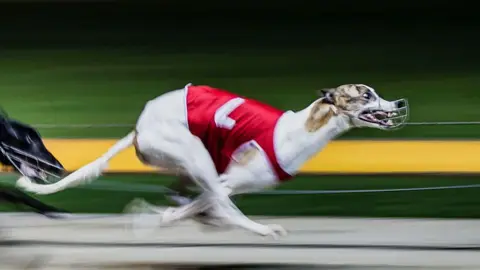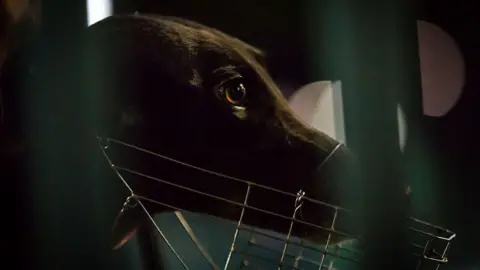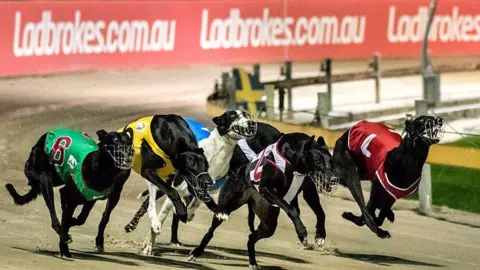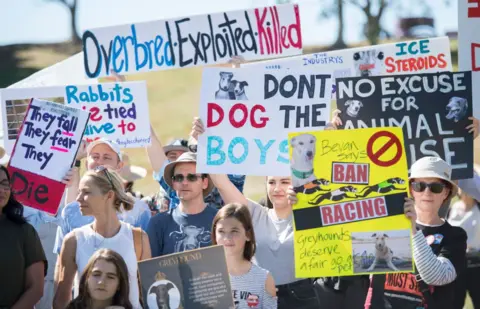Dying for sport: Abuse claims rock Australian greyhound racing
 Getty Images
Getty ImagesIn 2015 Australia’s multi-billion-dollar greyhound racing industry vowed it would clean up its act.
A damning investigation at the time had exposed the preventable deaths of as many as 17,000 young dogs a year - revelations so shocking the government of the day rushed to implement an ultimately short-lived ban.
Almost a decade later, Greyhound Racing New South Wales (GRNSW) - the epicentre of the sport in the country - is back in the spotlight for alleged abuse, due to the work of one whistleblower.
In an explosive report made public by lawmakers, the organisation's former chief veterinarian has described the industry as a hotbed of “exploitation and suffering”, claiming that dogs are being raced at “barbaric” rates, euthanised without cause, or left to rot in metal cages when they can no longer compete.
Executive heads are rolling, and an inquiry, which GRNSW says it “welcomes”, has been announced to investigate the accusations, as calls from critics to have greyhound racing outlawed grow louder.
But despite evidence of slipping public support, the state’s premier has said he won’t shut down the sport, prompting a standoff with those calling for that to happen.
“The reality is the greyhound racing industry cannot exist without systemic animal cruelty,” says NSW Animal Justice MP Emma Hurst.
“It will be shut down – it’s just a matter of when.”
 Getty Images
Getty ImagesAustralia has been touted as the world’s largest commercial greyhound racing industry - with roughly 60 tracks in operation. New Zealand, the US, the UK and Ireland are also home to markets, but none operate at the same velocity.
Thanks to online betting, Australia’s industry has seen rising profits in recent years, turning over A$8.3bn ($5.6bn; £4.3bn) in 2023 - with 75% of the money coming from Victoria and New South Wales (NSW), according to the greyhound protection organisation GREY2K.
The spark that ignited the current outcry over the sport’s practices was a “handover” letter, from GRNSW’s Chief Veterinary Officer Alex Brittan to his incoming replacement - his final act in a job that by his own account, had nearly broken him.
The 54-page document contains a litany of accusations - including claims that GRNSW had worked with vets “unaccepting of modern medicine” who were prone to euthanising dogs without cause, and that the company’s leadership was directing staff to treat animal welfare groups “as the enemy”.
Within hours of Mr Brittan’s letter becoming public, the chief of GRNSW Rob Macaulay had resigned and the rest of the company’s board is now fighting for their survival.
NSW’s Gaming and Racing Minister David Harris has announced an inquiry into Mr Brittan’s claims which will be led by the industry’s regulator - something which GRNSW has been quick to embrace.
“We welcome the opportunity for an external examination of our processes and record,” its acting CEO Wayne Billett wrote in a statement. And a spokesperson for GRNSW told the BBC that the organisation takes concerns related to animal welfare “very seriously”.
 Getty Images
Getty ImagesBut Mr Brittan’s account differs.
In his letter he described witnessing “cases of extreme distress” in which competing dogs had “recent pools of blood” around them after ripping off their toenails while “clawing” at their caged doors.
He also called out a flurry of “preventable” on-track deaths, due to greyhounds running into poles with “no padding on them” and questioned the figures GRNSW had put forward concerning how many retired dogs it had found homes for - a practice which gives the sport its social licence to operate.
Mr Brittan says that of the roughly 4,200 dogs entering the industry each year, only 1,600 were making it out and finding owners, with the rest living out their days in “industrial kennels”.
Further - he alleged that a company programme which had been set up to export retired greyhounds to the US, so that they could find homes there, had an alarming lack of oversight.
To prove his point, he told the story of Carey - a dog who died at Sydney airport after confusing its travelling box with a racer’s starter box and running into a fence at full speed when the door opened.
NSW’s premier Chris Minns said he would examine all the allegations put forward by Mr Brittan, but quickly ruled out a blanket ban on greyhound racing in the state.
“We're not going to shut down the industry, but we do take this report seriously,” he told reporters last week.
And Mr Harris reiterated that the government would make sure the industry was held to “the highest standards of animal welfare and integrity” once the new investigation had concluded.
But given GRNSW has weathered multiple crises - including a government-backed inquiry in 2016 which delivered findings of “systemic animal cruelty” and mass killings - advocates are sceptical another inquiry will yield results.
“The greyhound racing industry was already given a chance to clean up its act eight years ago, and it’s monumentally failed,” Ms Hurst told the BBC.
 Getty Images
Getty ImagesMr Brittan has also challenged the impartiality of the current investigation - saying it should be done by an external source, rather than the industry’s own regulator.
And he questioned why an all-out ban had been taken off the table already.
“It could be perceived as concerning that the premier and gaming minister have stated that the outcome of the inquiry is a foregone conclusion and that, irrespective of any findings, all bets are on, and the gambling will continue,” he said, according to the Guardian.
Around the world, the prominence and popularity of dog-racing for sport has been in decline.
In the US for example - which used to be one of the sport's largest industries - betting on greyhounds has been outlawed in all but a handful of states, and only two active tracks remain, both in West Virginia.
Advocates like Ms Hurst argue that the practice endures in Australia not because of community fanfare, but gambling profits.
The last time the industry was in the spotlight in 2016, over 80% of people polled by the country's national broadcaster said they wanted to see it shut down.
And in recent years, it has been outlawed in the Australian Capital Territory, while petitions calling for other jurisdictions to follow suit have made their way to several state parliaments.
GRNSW says it has no plans to go anywhere - and that racing, which first came to the nation’s shores in the late 1800s, can be done “sustainably”.
But Ms Hurst, and others calling for an end to the sport, say that the latest spate of allegations present a unique “opportunity” to “listen to the community and ban this cruel industry”.
